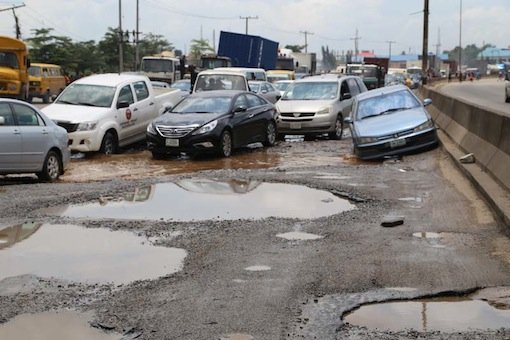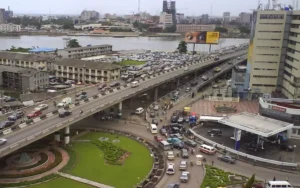
By David Akinmola
What should be a busy thoroughfare connecting Ago Junction to Ire-Akari via Ebey Road in Isolo Local Government Area has become a symbol of administrative failure, unchecked neglect, and deepening frustration among residents.
The once vital route linking residential estates, small businesses, markets, and schools—has crumbled into a stretch of potholes, stagnant floodwater, and disrepair, leaving commuters stranded, property devalued, and trust in local leadership at an all-time low.
For many residents, the condition of the Ago-Ire-Akari link road is not just an infrastructural problem but a painful reminder of broken promises by the current local government chairman, whose tenure has been marred by what many describe as “invisible leadership” and a failure to deliver even the most basic public amenities.
“It’s not just bad, it’s shameful,” said Chukwuemeka Nwafor, a tricycle operator who plies the route daily. “Every day, my keke [tricycle] breaks something. We spend more on repairs than we earn. And yet, the chairman will come during elections with loudspeakers promising to fix the road. After the votes, we are forgotten.”
The road, which should serve as a key bypass between major commercial corridors in Isolo, now resembles a washed-out dirt track. Potholes have widened into gaping craters, filled with muddy rainwater. During peak hours, the road becomes a nightmare, with motorists forced to crawl through or divert entirely—sometimes through narrow, unauthorized estate routes.
Pedestrians, including school children and the elderly, are no less affected. Several residents have reported injuries from falls and even minor accidents involving motorcycles and vehicles swerving to avoid road hazards. During the rainy season, parts of the road become flooded, creating breeding grounds for mosquitoes and exposing the area to heightened health risks.
“This road has become a health hazard,” said Mrs. Yetunde Salako, a mother of two who lives off Ebey Road. “Our children are constantly falling sick, especially during the rainy season. And what does the local government do? Nothing. Not even one visit from the chairman.”
The frustration is compounded by what many describe as the underutilization of local government autonomy, which was designed to empower councils like Isolo to take more control over grassroots development. With financial allocations from both the federal and state governments, the chairman, critics argue, has no excuse for the persistent infrastructural decay in such a strategic location.
“They claim local government autonomy is in place now, but what is the use of autonomy if you don’t use it for your people?” asked Damilola Adebayo, a civil engineer and community youth leader. “How much does it cost to grade and asphalt a stretch of road like this? Even palliative works are not being done. Not a single grader, no sign of effort.”
The silence from the chairman’s office has become deafening. Repeated attempts by residents and community associations to engage the local government have yielded no results. Letters have gone unanswered, meetings postponed indefinitely, and proposed public-private partnerships dismissed without follow-up.
Business owners in the area say the road condition has hit their bottom lines. Delivery vans refuse to enter the community. Ride-hailing drivers cancel trips to the area. Even brick-and-mortar stores report fewer walk-in customers due to the poor accessibility.
“I used to get customers from as far as Oshodi,” said Mr. Hassan Lawal, who runs an electronics store near Ago Junction. “Now, once they hear my shop is near Ire-Akari through Ebey, they say, ‘No way.’ I’ve lost 40% of my business. I pay my taxes to the local government, but what do I get in return?”
Residents are increasingly questioning how the local government chairman prioritizes its projects. While the roads crumble, residents say funds are being spent on cosmetic renovations of the council secretariat, political rallies, and social events that offer little to no benefit to the majority of the population.
“We are not asking for a bridge or an overhead expressway,” said Mrs. Juliet Eze, a retired teacher and long-time Isolo resident. “Just fix the road so people can go to work and children can go to school without swimming through potholes. Is that too much to ask?”
The road crisis has become a hot-button issue ahead of the next local government election, with several grassroots groups threatening to mobilize voters against the current administration. Already, posters and handbills calling for accountability have appeared across Isolo, urging residents to “remember the road” when voting.
Some residents have gone as far as proposing a class-action suit or public petition to compel the local government to take action. Others are considering crowdfunding to finance minor repairs, though many believe the burden shouldn’t be shifted to already overtaxed citizens.
“What kind of country makes its people pay twice—first in taxes, then from their pockets—just to get to work?” asked Obinna Uzo, a legal practitioner and resident. “We have a local government chairman who has failed in his most basic duty. No matter what budget figures they publish, we see the truth every day on this road.”
For the people of Ago, Ebey, and Ire-Akari, the state of the road is more than a pothole problem. It’s a collapse of trust, an indictment of failed leadership, and a metaphor for the larger governance crisis at the local level. As Lagos continues to evolve into a megacity, residents say their communities cannot afford to be left behind by the very people elected to serve them.
Until something changes, the people of Isolo will continue to navigate their lives—one pothole at a time.








